Sometimes, beekeeping doesn’t go according to the beekeeper’s plan. Bees are dynamic creatures, with free will, and sometimes, despite all the preparations, reading, attending guild meetings, and talking to beekeepers who are vastly more experienced than ourselves, the bees surprise us.
About a week ago during a nice warm afternoon we stopped by the hives to check on honey stores, and the feeders. The bees have been fortunate this winter so far. Even though mornings have been cold, it’s been dry, and the afternoons have been climbing into the mid-60s, so there’s been plenty of foraging activity in the apiary.
During our last visit we noted there was absolutely no activity at the entrance of the Rosemary hive, even though their neighbors were zipping in and out, and clearly bringing in lots of bright orange, and pale yellow pollen.
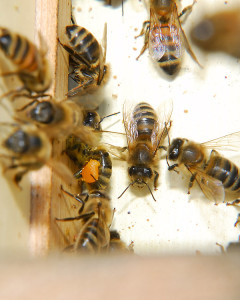
The entrance of the adjacent hive, Salvia, was bustling with activity, with plenty of pollen coming in
Rosemary, a package colony, had looked a fair bit weaker than our two feral colonies for at least a few weeks, but seemed to be hanging in there. Suddenly though, the entrance seemed eerily quiet.
We noted a few dead bees at the entrance, and fearing the worst, we popped the lid off the Rosemary hive, removed the feeder, and peered between the frames.
Silence. No bees, and looking down through the hive, I could clearly see the bottom board, and a few scattered dead bee bodies. The food in the feeder was untouched. Sadly it seemed the Rosemary hive, like Chamomile before it, was dead.
Because the New Year tends to be busy for us in the orchard, I postponed dissecting the Rosemary hive for a few days, each day looking at the entrance just to be sure. Still nothing. Yesterday I knew I needed to make time to get in there, see what happened, and at a bare minimum remove the pollen frames to discourage wax moths from moving in and destroying the combs.
I took off the lid, removed the feeder, and popped off the top hive body, which was completely full of capped honey, and set it aside.
The next box down I noticed just a few bees that seemed to be clustering at the top of one of the frames. At first I thought these were bees from the neighboring hives exploiting stores, although it seemed strange to me they were all in a clump. Robbers are usually more scattered throughout the hive.
I removed the adjacent frame and saw it was full of nectar. The whole frame was uncapped, but there was plenty of fresh nectar, and some scant pollen. Setting that frame aside, I went for the adjacent frame, where the bees were clustered. There was maybe one-half cup of bees, by volume.
I turned the frame over, and was completely shocked to see…THE QUEEN! Really? She’s Alive!?
I was sure this colony was dead.
I noticed there was some old capped brood, some partially emerged, but dead, and nothing else particularly remarkable. No eggs or larvae, but that’s to be expected this time of year. The few bees near her highness seemed to be relatively uninterested in her though.
Making sure I held the frame over the hive body, as the first rule of beekeeping is DON’T drop the Queen, I snapped a quick shot of her (above) to show Mr. Curbstone when he came home, just as proof that I wasn’t imagining things. Then, just as I pulled the viewfinder away from my eye, the Queen promptly flew off!
My heart completely sank. I watched, slack-jawed, as she lithely buzzed up toward my face (I swear she stuck out her tongue at me), hung a sharp left, and peeled off behind the Salvia hive. I tried to follow her, but soon lost her as she flew past some scrubby oaks. None of her attendants even tried to follow her.
In the blink of an eye, the Rosemary Queen had abdicated her throne, with not so much as “so long, and thanks for all the fish“[1].
All I could think about was…she was there…right there…I have a photo. I have proof! Right on that frame! I LOST HER?!?!?!
Nooooooooooooooooooooooooooooooooooooooooooooooooooooooooooooooooooooo!
Despite the massively diminished size of this colony, she had still survived, and my blasted ill-timed meddling caused her to leave. I was so mad at myself. In my defense, this whole darned thing started because I was sure this colony was dead in the first place, but still…*$&% it!
After a minute or two of ‘what ifs’ and ‘if onlys’ buzzing through my brain, and mumbling “stupid…stupid…stupid” repeatedly at myself, all the while scrutinizing the surrounding shrubs, and the ground in front of the hive stand, I closed up the hive, and dashed inside to call our significantly more experienced mentor.
I started the conversation with “Hey, you won’t believe it, I just did a REALLY REALLY REALLY stupid thing to one of our hives…” To which my mentor chuckled “So did I this morning! What did you do?” to which I replied “I broke the first cardinal rule of beekeeping, I lost the Queen“. There was silence for a moment, and then “so did I!“. We laughed, and I felt a little better, not much, but a little.
I filled him in on our Queen’s abdication, and then asked for his opinion on what to do next. It didn’t seem that emergency re-queening with a purchased queen would be useful in this case, as there are so few worker bees left in the colony, they’d barely be able to feed her highness, never mind be able to cover the brood to keep them warm. Do I do nothing, and just chalk it up to experience? Combine the remaining workers with another colony? Stand in the corner for the rest of the afternoon with my ‘bee-dunce’ hat on?
His recommendation was to go back out in the apiary, and take a second look near the hives, in the shrubs, on the ground, have a Queen cage handy, and just be sure she’s nowhere obvious near the hive, as Queens don’t tend to fly far. Then pop the top of the hive open slightly. It’s rare, but apparently it is possible she could find her way back to the hive. Really? Well, why not? I had nothing else to lose, right? The Queen is already gone!
Before I got off the phone with our mentor, he reassured me that this happens more often than I might think, and it’s happened to him numerous times, including this very day when he was trying to combine two weaker colonies to give those bees a better chance to survive the rest of winter, so at least I was in good company.

Queen catcher (left), and Queen cage (top). The marshmallows are use to plug the hole in the queen cage to stop her escaping.
With Queen catcher, Queen cage, and trusty mini-marshmallows in hand, I went back out to the apiary, still mentally kicking myself, and scoured every square inch near the hives. I saw a couple of bees crawling on the ground, but none were our missing Queen.
I cracked the lid open on the hive, hoping I didn’t set off a robbing frenzy, and pulled away the robbing screen at the entrance in case Her Royal Highness tried to return. Before the temperatures dropped too much in the afternoon, I went back out to replace the lid.
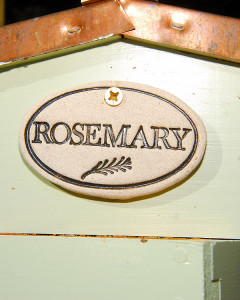
I was concerned that leaving the lid cracked open would incite a robbing frenzy, as this colony was so weak
There was robbing, no question. If I was the queen, I wouldn’t want to come home to that. I replaced the lid, and the robbing screen, and wondered if there was really any chance she may have made it back amidst all that pandemonium. It certainly seemed unlikely, it really seemed she flew off with intent.
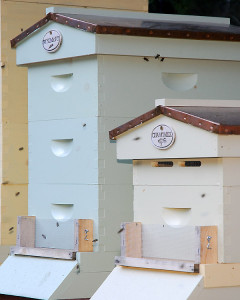
After repositioning the lid on the hive, bees from the Salvia and Lavender colonies were still trying to gain entrance to steal the honey
I’ll check the hive again this afternoon. What’s the worst that could happen, the Queen actually made it back, and I lose her again? If there’s no sign of her royal highness, which I doubt, we’ll go ahead and pull the pollen frames, and freeze them, to discourage wax moth, and divide the remaining stores between our two strong feral colonies, if only to get everyone in the apiary to calm down.
If by some miraculous chance I find the Queen in the hive, we’ll need to combine what’s left of this colony with a stronger hive, most likely the Lavender colony. If we leave them as is though, even if the Queen is in residence, they’re doomed to fail, there just aren’t enough of them.
In the meantime, I’ll chalk my first Queen loss up to experience. It was bound to happen, as every beekeeper loses a Queen at one time or another. However, the next time I do a winter hive check, as soon as I spot the Queen, there’ll be no photos…no curtsies…I’m slamming that lid SHUT!
————————
[1] So Long, and Thanks For All the Fish is the title of the fourth book in Douglas Adam’s Hitchhiker’s Guide to the Galaxy series.

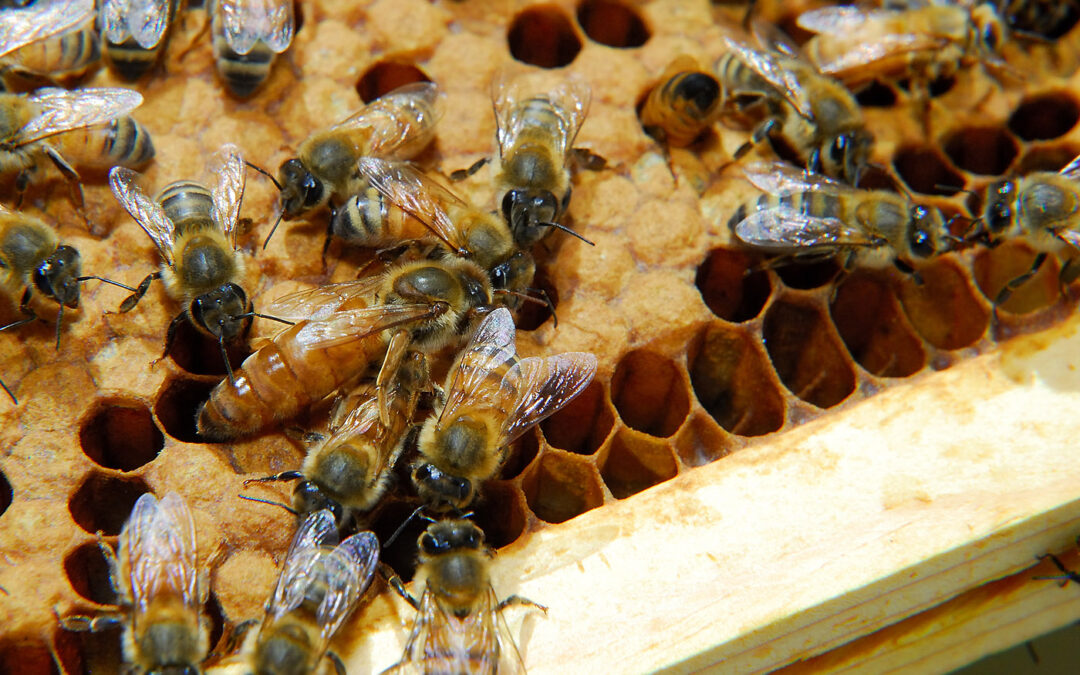
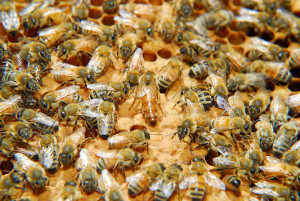
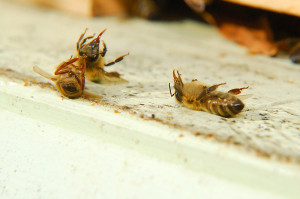
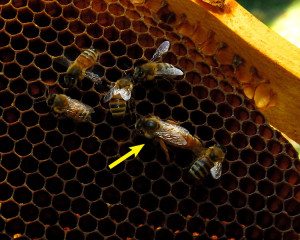

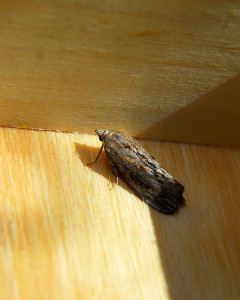
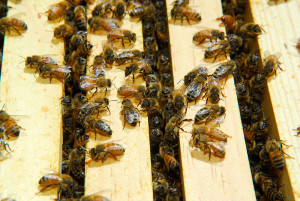







It’s rather interesting that the package colonies were the ones to collapse. Lucky that you managed to snag those ferals at the beginning of the year. Do you think the reasons for collapse are similar to Chamomile? I’m quite fascinated by this whole experience, learning a lot vicariously through your posts.
At our last Guild meeting it was brought up that the Italian package colonies aren’t as hardy as some other races (like the Russians, or Carniolans). The Italians don’t tolerate Varroa as well as some, as was proven with our Chamomile colony in the fall. I suspect the reasons for the collapse of this hive were similar to Chamomile. Although they survived the Thymol treatment, and went on to raise more brood, either they didn’t raise enough new bees to get through winter, or they didn’t raise the right kind of bees, the long-lived ‘winter-bees’. If they produce ‘summer bees’ at the end of the season, those bees don’t survive long enough to see the colony through to good weather again. Unlike Chamomile though, it doesn’t look like they starved.
That’s a bummer that Queen Rosemary gave up the throne. I can’t help but wonder if there’s more going on in their little brains than we imagine. Was she tired of running the hive? Tired of seeing her drones dwindle? Or did she just see the blue sky when you popped the lid and decided it looked like a nice day for a flight?
For all we’ve learned about bees over the centuries, I agree, there’s still much we don’t know. I suspect, but it’s just speculation, that realizing the colony was at the point of no return, she simply gave up. It froze here last night, so caught out alone in the cold, I’m sure she’s no longer with us. I hope she enjoyed her last flight at least.
I wonder why the workers all died. Maybe she knew there wasn’t enough there to feed her – so why stick around? I never knew there was so much to beekeeping! I have a lot more respect now for beekeepers.
It’s difficult to know for certain. Bees are coping with pests, like Varroa, and the newly reported Phorid Fly (Apocephalus borealis), along with various viral, fungal, and bacterial pathogens. It’s a really tough world out there for bees these days. Varroa, I feel, is still the greatest threat to honey bees here. Even if there was no Varroa in the hive now (as there was no brood rearing in winter), the damage to the colony in the fall from Varroa may have weakened the colony enough, either through disease, or through loss of population, that this hive was destined to fail. Personally I’m amazed honey isn’t $50 a jar! 😉
So very interesting. I, too, wonder why all the bees left and why there were so many dead ones. Fascinating post! So many times I’ve wondered what goes through the minds of animals and other wildlife.
ps. Your beehives are so pretty!
There actually were far fewer dead bees inside this hive than there were when Chamomile collapsed. I feel that Rosemary’s decline was more gradual though. Chamomile, in comparison, collapsed much more quickly. The undertaker bees in Rosemary may have been doing a better job clearing out their dead.
As for what the Queen was thinking, that’s anyone’s guess. It doesn’t seem very smart to abandon your colony. No court to feed you, no bees to keep you warm. Maybe she knew there was no reason to stay. The outcome would have been the same either way 🙁
Oh Clare, what a thing to happen! I’m no expert but it sounds like she had already abdicated and all but physically flown away before you got there anyway.
Was that colony particularly bothered by verroa mites?
Scrap that question on verroa Clare, I can see you answered it in a previous response while I was posting my question!
I agree, I think the Queen was done before I even opened the lid.
Actually, what is interesting in regards to Varroa, is after we treated with Thymol, the Rosemary hive seemed to have the least mites of all our hives. Still a very significant burden of mites though, and there’s no magic mite treatment to knock them back. My prediction back before treatment was that Salvia would be the first colony to crash, just based on mite counts. Our ferals seem to cope with the mites better than the Italians though. I’m definitely hoping to split those feral hives in spring, as they, at least so far, seem to be hardier stock! I don’t want to have to constantly baby the colonies just to keep them alive, I’d prefer to rear more mite-resistant bees if possible.
Clare,
This queen was not doing her job it seems so loosing her is no big deal. I would not loose sleep over loosing her.
I agree, she really wasn’t going to survive anyway, although that’s not necessarily her fault. We didn’t get the Varroa under control, and perhaps we weren’t feeding early enough during the dearth to give them the best chance of survival in the fall. That said though, we do feel these Italians aren’t made of the same tough stuff as our ferals. I think we’ll stick to ferals from here on out 😉
I loved this post. Your recounting is a riot, and the fairytale-ness of it all – the Rosemary hive, the tiny queen box (with marshmallows to seal the ends!)… I’m sorry a great story came along with much angst on your part. Hoping your other hives do well in 2012.
It really was a day full of surprises. I thought I knew exactly what I’d be doing when I got out of bed yesterday morning, but apparently our bees decided to keep me on my toes. First I was shocked to find her, then I was shocked she thumbed her nose at me and left! Never a dull moment around here, but an important lesson learned. When the Queens aren’t laying in winter, they don’t seem to be as heavy, and are perfectly capable of taking flight with no warning! 😛
Oh my, I feel your pain – REALLY I do! I’m always afraid I will squash Her Royal Highness whenever I get in our hive, even though I know the likelihood of that is small. But to see her fly away right before your eyes? The nerve!
This is yet another reason why I have muted expectations about future honey harvests. When things go right – the honey is sweet. But there’s so many things to go wrong when beekeeping, I think gardening is easier!
It really was something I just didn’t expect. I too am always afraid I might accidentally squish the Queen, but the thought never occurred to me that she might just pack her bags and leave, not without the rest of the colony. Swarming, sure, absconding even, but to fly off solo was a surprise! I agree, after beekeeping for almost a year, gardening is definitely easier! 😛
Sorry to hear this happened. Hopefully she is clse by and will return…don’t be too hard on yourself…we make many mistakes as we learn new skills and these are the most profound lessons…you are doing amazing work with the bees…
I checked the hive over the weekend as we had some beautifully warm weather. The Queen did not return, so we’ve torn down the Rosemary hive, removed the pollen, and distributed the nectar and honey stores between our two remaining colonies to stop them robbing out the hive. I was actually surprised how much nectar was in the hive for January, so there must be something of a nectar flow going on at the moment, despite our lack of rain.
I wonder how she can just do that? what would make her permanently leave? this is extremely interesting. Where exactly would a queen without her been subjects go?
Bees are known to abscond from a colony if the hive conditions don’t meet their needs, although in those cases I think of absconding as the entire colony packing up their bags in search of new real estate. I’m not a bee, but I suspect the Queen realized the futility of staying with so little population left to support her. A Queen without her subjects, is a dead Queen. She has no one to feed her, and if she tried to enter an existing colony, I suspect she’d be killed.
I am intrigued. What was her plan? It does not seem like she could find a new hive to govern. So much to learn.
I can only assume she had a Garbo moment…”I want to be alone” 😉
Wow, the complicated life of bees! I am fascinated every time I read your posts on bees. What an unfortunate turn of events! I suppose nature does her thing and there must be a good reason for all this but what? Don’t be too hard on yourself. I think it is good to look at it as lesson learned.
I’m sure there was a reason behind it, one that my non-bee brain is likely to never fully understand. The good news is, our feral colonies are looking quite robust for January, with lots of food stores (more now that we’ve given them the stores from this hive too). Hopefully we’ll be able to create some good splits from those hives this spring, and our apiary will be that much stronger for selecting from bees that did survive the winter.
this was a heart-in-mouth story Clare and did wonder if there was going to be a Disney ending. Instead there is fingers crossed and assurance that contrary to a dunce you are responsible, informative and highly entertaining.
Happy 2012 to all the livestock at CV – and yourselves
Happy New Year Laura! I think I only felt dunce-like as the thought of the Queen just taking off like that hadn’t really occurred to me before. It does somewhat make sense in that she wasn’t egg-laying, and back to her ‘flighting-weight’ during the winter months. I was quite cautious opening the other hives this weekend, going in just enough to transfer the honey frames to them, and quickly closing them back up! 😛
I was also surprised it was the package bees. We’re always harder on ourselves it seems, but you did good. “Just work the problem”, my engineer Dad used to say.
Swearing does help. I neatly cut my new irrigation line in two last Spring while planting and said something that scared the dog, my husband told me.
Hope it doesn’t hurt too bad for too long…
I’m not surprised the package bees have failed before our ferals. Commercial beekeepers typically throw the kitchen sink at their colonies in regards to mite treatments and medications. We don’t want to have to pour the medicine cabinet into our colonies, so we’re opting more for the natural selection method anyway. These bees were noticeably weaker than our ferals all season, in regards to population. Ferals tend to produce lots of bees at the expense of honey, but if that’s what it takes to have strong colonies that survive winter, I’ll take the hit on honey instead. I’d rather have strong bees.
I’m surprised she flew off Clare but even more surprised that her attendants didn’t follow her. I think there must have been a domestic and maybe she didn’t abdicate but was told to pack her bags. 🙂
I do wonder what the hive dynamic was, and the whispering going on among the bees in her court 😉 She was definitely snubbed!
I have followed your bee colonies with fascination. It’s been a while since you posted this. What ultimately happened? I was hoping for a happy ending, with the errant queen having returned!
We went back into the hive that weekend, and confirmed the Queen had not returned. We removed all the frames with pollen, and distributed the honey frames between the remaining colonies. On the upside, we have an extra hive for our spring splits, and both the feral colonies look very good so far this winter. With rain on the way for the next week though, we’ll need to keep a close eye on stores as it looks like both feral colonies are already starting to build up.
Wow, what a story. I’m sorry she took off and left you hanging.
Your website is beautiful, it’s fun to visit. We lived in Santa Clara for three years and loved it when we got to drive through the Santa Cruz Mountains – that must be one of the most beautiful places on earth.
It happens. But I shall tell my beekeeping sister in law about the marshmallow plug.